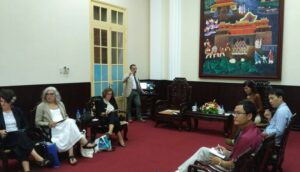The Quality of A4U Research Stands Out Internationally
The Alianza 4 Universidades recently published a report on research activities conducted at its member universities, entitled “INFORME 2020 DE LA ACTIVIDAD CIENTÍFICA DE LAS UNIVERSIDADES DE LA ALIANZA 4 UNIVERSIDADES (2009-2018)”. The report was drawn up by the Research Institute for Higher Education and Science (INAECU) and highlights the scientific and technological quality of A4U, both at domestic and international levels.
The report points to competitiveness and scientific production as the strong point of the A4U member universities, given that they have obtained a total of 17.37% of funding for European projects under the Framework Programme for Research and Innovation, Horizon 2020, within the Spanish university system, and have an average of 1.58 projects for every 100 lecturers, while the average at national level is 0.55 projects for every 100 lecturers. Of the total scientific production in Spain analysed by the WoS database for the period 2009-2018, 13.6% is produced by one of the four universities of the A4U group. The A4U presents a high level of productivity (2.11 articles per lecturer) and is 2.62 times more productive than the average reached among other Spanish universities (0.81 articles per lecturer).
The data also shows that A4U takes part in a large number of international collaborations. Member universities represent 15.67% of all international collaborations conducted by Spanish universities.
With regard to the quality and impact of scientific publications, the A4U presents a greater percentage of documents in the first quartile (55.75%) than other universities in Spain (52.92%). During the period analysed, the A4U published 11.95% of its production in TOP3 journals, whereas other universities published 9.95% of their production. In absolute impact (total number of citations), the A4U received 16.4% of all citations, while the related impact of A4U throughout the period analysed was 21.27 citations per document, above the average reached by all universities in Spain, which was 17.62 citations per document.
With regard to technological production, the study confirms that the patents issued to A4U member universities represent 6.48% of all patents issued within the Spanish university system.
The analysis also includes a comparative study of the A4U with other international university systems. On the one hand, it compares it to the four universities belonging to the Yerun association and its positioning in the latest ARWU ranking (Brunel University London, University of Antwerp, Dauphine Université Paris and Tor Vergata University of Rome). On the other hand, it compares it to the five top British universities in terms of number of research and teaching staff members: University College London; Oxford University; Cambridge University; Imperial College of London; and University of Manchester. These five institutions are among the top 40 of the ARWU ranking.
The analysis shows that the research quality of the A4U institutions maintains a level of excellence at international scale, as well. Its production in journals included in the Web of Science (WoS) database for the 2014-2018 period is higher than each of the universities belonging to the Yerun association, as well as the sum of production of all member universities. At the same time, the A4U occupies fifth position in production in WoS when compared to the British universities analysed.
Annual productivity per research and teaching staff member during the 2014-2018 period places the A4U in third position with regard to the British universities analysed, and in second place versus the Yerun universities selected for analysis. In the 2014-2018 period, the citations per document place A4U in second position when compared to the Yerun universities included in the evaluation, and in fifth position regarding British universities. The A4U presents the second highest percentual value in Highly Cited Papers when compared to the Yerun universities, and fifth highest regarding British universities. Lastly, the report points out A4U’s second position in percentage of open access publications, in comparison to the Yerun universities selected for analysis.
The research activity was evaluated using a set of indicators on economic resources, competitiveness, excellence, scientific and technological production, visibility in international rankings, and research training, which were based on the information obtained by the IUNE Observatory; the Spanish Centre for the Development of Industrial Technology (CDTI); the Web of Science (WoS); the ARWU, QS and THE rankings; the Spanish Patent and Trademark Office (OEPM); the European Patent Office (EPO); the Ministry for Universities; and the Spanish National Statistics Institute (INE).




















